The purposes of bonsai are primarily contemplation for the viewer, and the pleasant exercise of effort and ingenuity for the grower.
By contrast with other plant cultivation practices, bonsai is not intended for production of food or for medicine.
Instead, bonsai practice focuses on long-term cultivation and shaping of one or more small trees growing in a container.
A bonsai is created beginning with a specimen of source material. This may be a cutting, seedling, or small tree of a species suitable for bonsai development.
Some species are popular as bonsai material because they have characteristics, such as small leaves or needles, that make them appropriate for the compact visual scope of bonsai.
 Coussin's guide forms a lovely and thorough introduction to the ancient art of bonsai gardening.
Coussin's guide forms a lovely and thorough introduction to the ancient art of bonsai gardening.
The book "Bonsai School was in my mailbox two days ago. The best thing I can say about the book is that after just a couple of pages I started saying to myself, "
I didn't know that". After 23 years of bonsai it was great to see a book that was teaching me new things page after page. The book is a beautiful book.
 An Introduction to Bonsai: History, Cultivation and Size Classifications.
An Introduction to Bonsai: History, Cultivation and Size Classifications.
Originating in Chinese pen-zai, Japanese bonsai developed its localization of techniques and aesthetics after its introduction to Japan by imperial embassiesKorean it is called bunjae. returning from China in the ninth century.
 Bonsai trees change over time as well as through the seasons.
Bonsai trees change over time as well as through the seasons.
Fall might just be the most spectacular time to enjoy deciduous Bonsai; this is the time when leaves change color, resulting in dramatic appearances of the trees.
Bonsai artist Luis Vallejo (from Spain) agreed to do a series with Bonsai Empire; the seasons of Bonsai
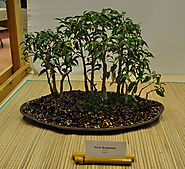 A gardener's relationship with birds is one of mutual benefit.
A gardener's relationship with birds is one of mutual benefit.
The gardener provides for a few of the birds basic needs, and the birds help to keep down the insect population while treating us to an unending source of entertainment.
Birds take their role as insect predator seriously.
A single bird will gulp down 500 to 1,000 insects in an afternoon.
Birds have four primary needs: food, water, shelter, and a place to raise a family. As you'll see, these needs are easily met.
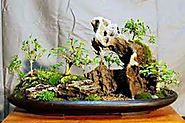 Bonsai assembling the CollectionPredominantly composed of donated specimens, the collection includes gifts from local enthusiasts and Midwest Bonsai Society members.
Bonsai assembling the CollectionPredominantly composed of donated specimens, the collection includes gifts from local enthusiasts and Midwest Bonsai Society members.
In 2000, Susumu Nakamura, a Japanese bonsai master and longstanding friend of the Chicago Botanic Garden, donated 19 of his finest bonsai to the collection.
This gift enabled the collection to advance to world-class status.
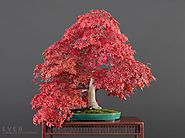
One of the things I like most about Bonsai is the fact that it is a living art. Bonsai trees change over time as well as through the seasons.
Fall might just be the most spectacular time to enjoy deciduous Bonsai; this is the time when leaves change color, resulting in dramatic appearances of the trees.
Bonsai artist Luis Vallejo (from Spain) agreed to do a series with Bonsai Empire; the seasons of Bonsai.
The first edition is the Fall. Enjoy these amazing photos!
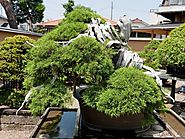
The bonsai tree is a Japanese art form using miniature trees grown in containers.
The purposes of bonsai are primarily contemplation (for the viewer) and the pleasant exercise of effort and ingenuity (for the grower).
But as much as I'm sure you've heard about this practice, most of us are only aware of a few limited types of bonsai tree, when in fact, there are hundreds of different types
 A Guide To Bonsai Leaves.
A Guide To Bonsai Leaves.
Here are the leaves of a number of common plants that you may find in a bonsai nursery.
1. Japanese black pine (Pinus
thunbergii)
2. Short needled spruce
3. Yew (Taxus bacata)
4. Japanese cedar (Cryptomeria
japonica)
5. Chinese juniper (Juniperus
chinensis)
 Bonsai plants care is a job which needs to be done on a regular basis, and cannot be taken for granted.
Bonsai plants care is a job which needs to be done on a regular basis, and cannot be taken for granted.
Bonsai trees are generally very delicate.
They need a lot of care and attention.
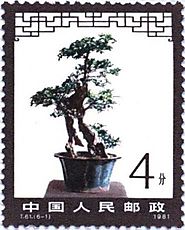 People's Republic of China (Mainland).
People's Republic of China (Mainland).
"Miniature Landscapes" (Set of six, issued March 31, 1981)
(actual area inside solid black border: 27 x 32 mm [first three] or 24 mm x 35 mm [second three];also as article by Rose Chang w/b&w images in Bonsai Journal, ABS, Vol. 15, No. 4, Winter 1981, pg. 73)
Examples of Shu Zhuang Pen Jing, tray landscapes made only with trees.
4 fen Chinese Elm
Ulmus parvifolia Jacq.
8 fen "Garden" Juniper
Juniperus chinensis L.
If you liked this article, subscribe to the feed by clicking the image below to keep informed about new contents of the blog:
By contrast with other plant cultivation practices, bonsai is not intended for production of food or for medicine.
Instead, bonsai practice focuses on long-term cultivation and shaping of one or more small trees growing in a container.
A bonsai is created beginning with a specimen of source material. This may be a cutting, seedling, or small tree of a species suitable for bonsai development.
 |
| Some species are popular as bonsai material because they have characteristics. |
2017 Top 10: Our Most Popular Posts of the Year | The Ancient Art Of Bonsai.
Bonsai can be created from nearly any perennial woody-stemmed tree or shrub speciesthat produces true branches and can be cultivated to remain small through pot confinement with crown and root pruning.Some species are popular as bonsai material because they have characteristics, such as small leaves or needles, that make them appropriate for the compact visual scope of bonsai.
Coussin's guide forms a lovely and thorough introduction to the ancient art of bonsai.
 Coussin's guide forms a lovely and thorough introduction to the ancient art of bonsai gardening.
Coussin's guide forms a lovely and thorough introduction to the ancient art of bonsai gardening.The book "Bonsai School was in my mailbox two days ago. The best thing I can say about the book is that after just a couple of pages I started saying to myself, "
I didn't know that". After 23 years of bonsai it was great to see a book that was teaching me new things page after page. The book is a beautiful book.
An Introduction to Bonsai: History, Cultivation and Size Classifications.
 An Introduction to Bonsai: History, Cultivation and Size Classifications.
An Introduction to Bonsai: History, Cultivation and Size Classifications.Originating in Chinese pen-zai, Japanese bonsai developed its localization of techniques and aesthetics after its introduction to Japan by imperial embassiesKorean it is called bunjae. returning from China in the ninth century.
Read also: Bonsai Gardening Secrets: Few know the long and rich tradition associated with Korea.
Top 10: Greatest Bonsai Trees.
 Bonsai trees change over time as well as through the seasons.
Bonsai trees change over time as well as through the seasons.Fall might just be the most spectacular time to enjoy deciduous Bonsai; this is the time when leaves change color, resulting in dramatic appearances of the trees.
Bonsai artist Luis Vallejo (from Spain) agreed to do a series with Bonsai Empire; the seasons of Bonsai
Attracting birds to the garden.
 A gardener's relationship with birds is one of mutual benefit.
A gardener's relationship with birds is one of mutual benefit.The gardener provides for a few of the birds basic needs, and the birds help to keep down the insect population while treating us to an unending source of entertainment.
Birds take their role as insect predator seriously.
A single bird will gulp down 500 to 1,000 insects in an afternoon.
Birds have four primary needs: food, water, shelter, and a place to raise a family. As you'll see, these needs are easily met.
2017 Top 10: Our Most Popular Posts of the Year | The Ancient Art Of Bonsai.Click to Tweet
The Chicago Botanic Garden’s bonsai collection is regarded by bonsai experts as one of the best public collections in...
 Bonsai assembling the CollectionPredominantly composed of donated specimens, the collection includes gifts from local enthusiasts and Midwest Bonsai Society members.
Bonsai assembling the CollectionPredominantly composed of donated specimens, the collection includes gifts from local enthusiasts and Midwest Bonsai Society members.In 2000, Susumu Nakamura, a Japanese bonsai master and longstanding friend of the Chicago Botanic Garden, donated 19 of his finest bonsai to the collection.
This gift enabled the collection to advance to world-class status.
The Ancient Art of Bonsai. Bonsai Seasons: Spectacular Fall Colors.

One of the things I like most about Bonsai is the fact that it is a living art. Bonsai trees change over time as well as through the seasons.
Fall might just be the most spectacular time to enjoy deciduous Bonsai; this is the time when leaves change color, resulting in dramatic appearances of the trees.
Bonsai artist Luis Vallejo (from Spain) agreed to do a series with Bonsai Empire; the seasons of Bonsai.
The first edition is the Fall. Enjoy these amazing photos!
Top 5: Oldest Bonsai Trees

The bonsai tree is a Japanese art form using miniature trees grown in containers.
The purposes of bonsai are primarily contemplation (for the viewer) and the pleasant exercise of effort and ingenuity (for the grower).
But as much as I'm sure you've heard about this practice, most of us are only aware of a few limited types of bonsai tree, when in fact, there are hundreds of different types
A Guide To Bonsai Leaves.
 A Guide To Bonsai Leaves.
A Guide To Bonsai Leaves.Here are the leaves of a number of common plants that you may find in a bonsai nursery.
1. Japanese black pine (Pinus
thunbergii)
2. Short needled spruce
3. Yew (Taxus bacata)
4. Japanese cedar (Cryptomeria
japonica)
5. Chinese juniper (Juniperus
chinensis)
Bonsai Care: What to consider when looking after your plants.
 Bonsai plants care is a job which needs to be done on a regular basis, and cannot be taken for granted.
Bonsai plants care is a job which needs to be done on a regular basis, and cannot be taken for granted.Bonsai trees are generally very delicate.
They need a lot of care and attention.
Bonsai on Postage Stamps: People's Republic of China (Mainland).
 People's Republic of China (Mainland).
People's Republic of China (Mainland)."Miniature Landscapes" (Set of six, issued March 31, 1981)
(actual area inside solid black border: 27 x 32 mm [first three] or 24 mm x 35 mm [second three];also as article by Rose Chang w/b&w images in Bonsai Journal, ABS, Vol. 15, No. 4, Winter 1981, pg. 73)
Examples of Shu Zhuang Pen Jing, tray landscapes made only with trees.
4 fen Chinese Elm
Ulmus parvifolia Jacq.
8 fen "Garden" Juniper
Juniperus chinensis L.
If you liked this article, subscribe to the feed by clicking the image below to keep informed about new contents of the blog:

Magnificent stamps, very good article
ReplyDeleteThanks for your comment Maia, regards.
Delete